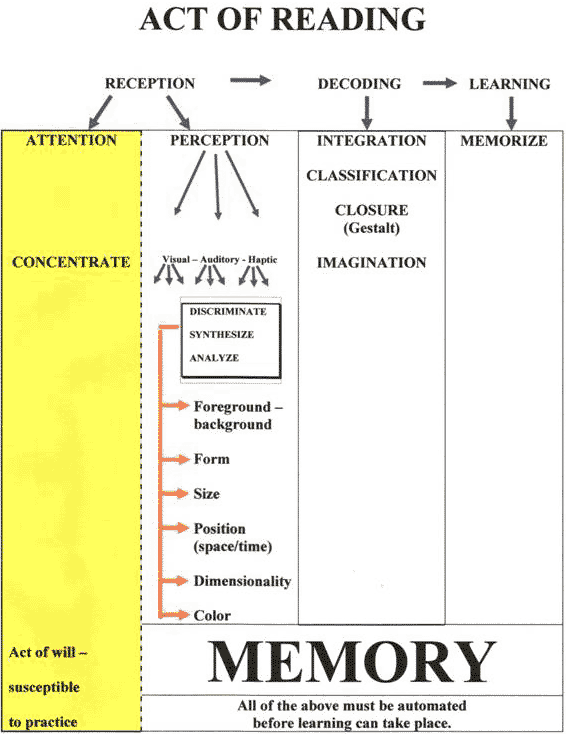| Magazine Home I Links I Contact Us |
|
Home |
Concentration: Its Role in the Act of ReadingReading must be regarded as an act of communication. There is a communicator (the author of the book that the reader is reading), there is a message (transferred to the reader via symbols on paper), and there is a recipient of the message (the reader). Concentration plays a major role in the reception of the message. The reading act is a unitary occurrence, meaning that the actions taking place while one is reading occur simultaneously. However, for the purpose of this discussion, these actions will be divided into steps, and a schematic diagram representing these steps of the reading act is shown below. This article focuses on the first step, i.e. reception of the written message and specifically the role of concentration in the reception of the message.  There are many factors involved in the reception of the message when a person is reading. The first of these is that the reader must pay attention. Paying attention is a body function, and therefore does not need to be taught. However, paying attention as such is a function that is quite useless for learning, because it is only a fleeting occurrence. Attention usually shifts very quickly from one object or one thing to the next. The child must be taught to focus his attention on something and to keep his attention focused on this something for some length of time. When a person focuses his attention for any length of time, we refer to it as concentration. Paying attention therefore, is the body function that makes the skill of concentration possible, just as the functions of seeing and hearing make the skills of looking and listening possible. Concentration rests on two legs. First, it is an act of will and cannot take place automatically. The will to focus attention on the message must be sustained in order to carry out all the actions needed to fully comprehend the message. Second, it is also a skill, and therefore has to be taught. Although learning disabilities specialists acknowledge that "the ability to concentrate and attend to a task for a prolonged period of time is essential for the student to receive necessary information and complete certain academic activities," it seems that the ability to concentrate is regarded as a "fafrotsky" — a word coined by Ivan T. Sanderson, and standing for "Things that . . . FAll FROm The SKY." Children who cannot concentrate — simply because they have not learned to do so — are therefore frequently diagnosed as suffering from ADD ("attention deficit disorder"). If one inquires what has been done to teach these children to concentrate, one invariably finds that nothing has been done at all. Concentration must be taught, after which one's proficiency can be constantly improved by regular and sustained practice. In the same way, one can also teach them all the other skills that are foundational to reading, and then one finds that the reading ability of a child (or adult), for whom reading previously was a seemingly endless nightmare, improves by leaps and bounds. |
| Home A B C D E F G H I J K L M N O P Q R S T U V W X Y Z |